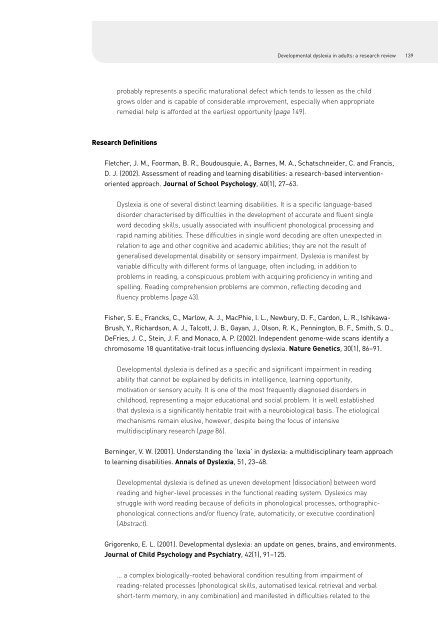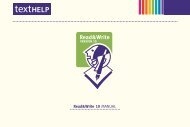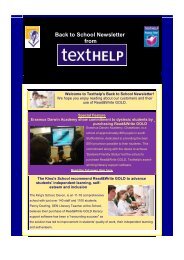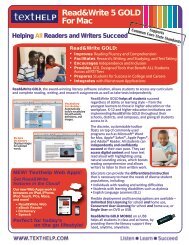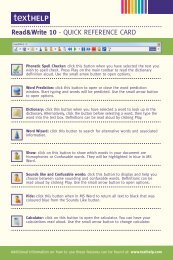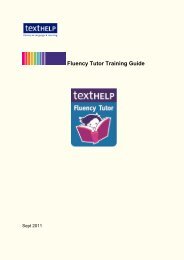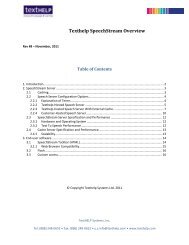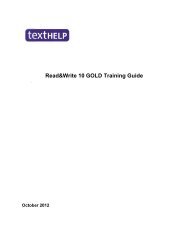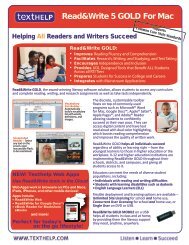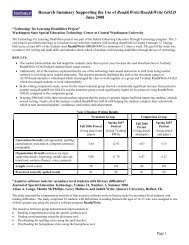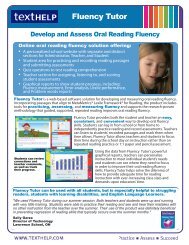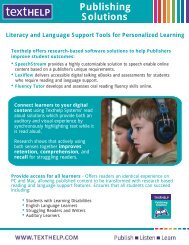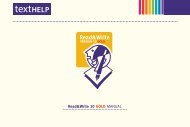01 NRDC Dyslexia 1-88 update - Texthelp
01 NRDC Dyslexia 1-88 update - Texthelp
01 NRDC Dyslexia 1-88 update - Texthelp
Create successful ePaper yourself
Turn your PDF publications into a flip-book with our unique Google optimized e-Paper software.
Developmental dyslexia in adults: a research review 139<br />
probably represents a specific maturational defect which tends to lessen as the child<br />
grows older and is capable of considerable improvement, especially when appropriate<br />
remedial help is afforded at the earliest opportunity (page 149).<br />
Research Definitions<br />
Fletcher, J. M., Foorman, B. R., Boudousquie, A., Barnes, M. A., Schatschneider, C. and Francis,<br />
D. J. (2002). Assessment of reading and learning disabilities: a research-based interventionoriented<br />
approach. Journal of School Psychology, 40(1), 27–63.<br />
<strong>Dyslexia</strong> is one of several distinct learning disabilities. It is a specific language-based<br />
disorder characterised by difficulties in the development of accurate and fluent single<br />
word decoding skills, usually associated with insufficient phonological processing and<br />
rapid naming abilities. These difficulties in single word decoding are often unexpected in<br />
relation to age and other cognitive and academic abilities; they are not the result of<br />
generalised developmental disability or sensory impairment. <strong>Dyslexia</strong> is manifest by<br />
variable difficulty with different forms of language, often including, in addition to<br />
problems in reading, a conspicuous problem with acquiring proficiency in writing and<br />
spelling. Reading comprehension problems are common, reflecting decoding and<br />
fluency problems (page 43).<br />
Fisher, S. E., Francks, C., Marlow, A. J., MacPhie, I. L., Newbury, D. F., Cardon, L. R., Ishikawa-<br />
Brush, Y., Richardson, A. J., Talcott, J. B., Gayan, J., Olson, R. K., Pennington, B. F., Smith, S. D.,<br />
DeFries, J. C., Stein, J. F. and Monaco, A. P. (2002). Independent genome-wide scans identify a<br />
chromosome 18 quantitative-trait locus influencing dyslexia. Nature Genetics, 30(1), 86–91.<br />
Developmental dyslexia is defined as a specific and significant impairment in reading<br />
ability that cannot be explained by deficits in intelligence, learning opportunity,<br />
motivation or sensory acuity. It is one of the most frequently diagnosed disorders in<br />
childhood, representing a major educational and social problem. It is well established<br />
that dyslexia is a significantly heritable trait with a neurobiological basis. The etiological<br />
mechanisms remain elusive, however, despite being the focus of intensive<br />
multidisciplinary research (page 86).<br />
Berninger, V. W. (20<strong>01</strong>). Understanding the ‘lexia’ in dyslexia: a multidisciplinary team approach<br />
to learning disabilities. Annals of <strong>Dyslexia</strong>, 51, 23–48.<br />
Developmental dyslexia is defined as uneven development (dissociation) between word<br />
reading and higher-level processes in the functional reading system. Dyslexics may<br />
struggle with word reading because of deficits in phonological processes, orthographicphonological<br />
connections and/or fluency (rate, automaticity, or executive coordination)<br />
(Abstract).<br />
Grigorenko, E. L. (20<strong>01</strong>). Developmental dyslexia: an <strong>update</strong> on genes, brains, and environments.<br />
Journal of Child Psychology and Psychiatry, 42(1), 91–125.<br />
… a complex biologically-rooted behavioral condition resulting from impairment of<br />
reading-related processes (phonological skills, automatised lexical retrieval and verbal<br />
short-term memory, in any combination) and manifested in difficulties related to the


